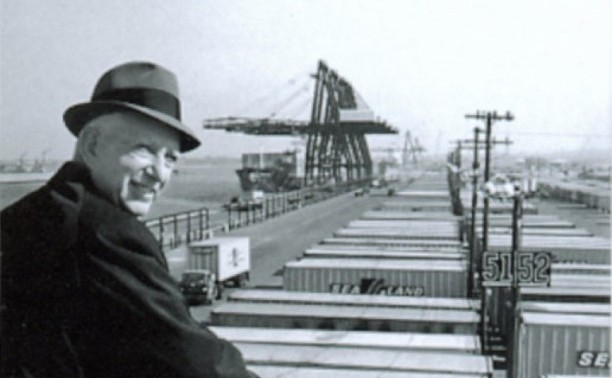ул. Двинская 5/7,
г. Санкт-Петербург, 198035
Новости и события16мая 1828 It could get a whole lot worse (На фото: Малькольм МакЛин, родоначальник современного грузового контейнера и контейнеровозов) MAY 4TH, 2016 ANDREW CRAIG-BENNETT I am going to suggest that, far from being near the bottom of the classic shipping cycle, we are at a point where things just might get a whole lot worse. Let us –for a moment – stand back from the business we all love and try to see the Big Picture. Rates of return in shipowning are dire – they have been dire since the 1970s – we all know that. The business is mature and cyclical – we all know that. It’s all about the oil price – we very often say that, even if we don’t really mean it. The only way to make real money is to get your investment timing right. And so on, and so forth. Here’s why. There have been very few real changes in the technology of the industry in the lifetime of most of us. There have been incremental improvements, but nothing in the 40 years from 1976 to 2016 compares with what went on in the 40 years from 1936 to 1976. In 1936 ships were rivetted up on slipways, driven by reciprocating steam engines and Scotch boilers, or occasionally by turbines or primitive diesel engines, and whether they were tankers or tweendeckers, they were all much the same size – which we would now call small. Cargo moved in crates and sacks, lifted in and out by derricks. Wheelhouses contained a magnetic compass and a steering wheel and no electronics. Passenger ships carried people from A to B. There were no containerships, no ro-ros of any sort, no gas carriers, no chemical tankers, no bulk carriers. In 1976, ships were much as they are today. The big passenger ships and containerships were not quite as big, but big tankers were bigger. And, apart from details, that was it. We are perhaps the most unimaginative generation in the history of merchant shipping. The reason why we have turned a business that was famous for making fortunes into a casino that destroys value at least as fast, if not much faster, than it creates it, is that we have not found ways to do things better. The best that we have come up with have been ways to do the same thing slightly cheaper, in a more standardised way. That’s only half the problem. Up to now, we have been able to count on a secular trend of rising demand – our version of Moore’s Law is that ton mileage doubles every 15 years. This rise in demand has tended to bail us out by mopping up excesses in newbuilding. One of the reasons for the excess in newbuilding is that ships have got cheaper and simpler to build, needing far fewer man hours to throw the ever cheaper steel together. Shipbuilding has advanced; shipowning has not. The state of the global economy suggests that we may be coming to the end of that regular doubling of ton mileage, which has been driven by globalisation – specifically the homogenisation of demand and the globalisation of sourcing – as there is a move to deliberately manufacture as close to where the demand is as possible. Consider the 3D printer – at the moment, not much more than a toy, but capable of very much more – and consider the very widespread demand for better employment opportunities, along with the demands for ‘local’ foods, and, above all the migration of so much human activity onto screens and virtual worlds. These are not things that do a lot for container lines, or bulk carriers, or even tankers, much good. Now consider the poor old planet, which really cannot take much more. The growth in demand for seaborne trade has to come to an end. We can all see that. The real problem is working out how to make a lot of money in a non-expansionary shipping market. Time for a Malcolm McLean (pictured), or Alfred Holt, or Aristotle Onassis, type Big Idea. Anybody got one? Andrew Craig-Bennett works for a well known Asian shipowner. Previous employers include Wallem, China Navigation, Charles Taylor Consulting and Swire Pacific Offshore. Andrew was also a columnist for Lloyd's List for a decade.
Будь первым Вниз↓➝Войти |
Оформление подписки |




